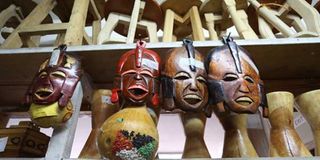Prisons unlock inmates’ creative side

Some of the art pieces made by inmates from across the country on display in this picture taken at Magereza House on July 23, 2014. PHOTO | BILLY MUTAI
What you need to know:
- According to the director in charge of prison enterprises, Mr Josephat Ituka, the project dates back to 1927, and it is being undertaken in 90 prisons across the country.
- Ms Ondili says that there is the Hobbies and Handcraft Programmes where prisoners are allowed to transact their products by accepting orders from warders and police who then pay them.
Seventy-four year old Mike Wambwa is serving a life sentence at Kamiti Maximum Security Prison in Kiambu.
He has been at the penitentiary for 24 years. His fellow inmate, 38-year-old David Ongai, has served 14 years. He too, is serving a life sentence.
The two are part of the 600 inmates from prisons across the country who have undergone vocational training under the Kenya Prisons Enterprise Industry.
This is one of the many programmes that the Kenya Prisons Service runs to rehabilitate inmates serving six years and above to prepare them for life outside prison.
According to the assistant commissioner of prisons, Mr Henry Kisingu, the programmes are meant to provide inmates with meaningful work experience since most of them look forward to ultimately returning to their communities.
Under these programmes, inmates spend hours each day honing their skills in jobs such as mechanics, metalwork, carpentry, tailoring, fabric design, ceramic and stone carving.
CHANGE FROM INSIDE OUT
The sergeant in charge of sales at the KPS showroom at Magereza House, Community area, in Nairobi, Alice Ondili, says that prisoners begin work at 8a.m. until 4 p.m.
And with loads of time on their hands, the inmates have been churning out an array of intricately designed furniture, carvings, paintings, and beautiful art pieces.
According to the director in charge of prison enterprises, Mr Josephat Ituka, the project dates back to 1927, and it is being undertaken in 90 prisons across the country.
“This idea by the colonialists was based on the belief that vocational training was best way to keep prisoners busy and to give them some form of self esteem, because they could produce work that would be sold to maintain their needs,” he says.
And the products are of very high quality. Most of them are made from mahogany; they include seats, wardrobes, office cabinets and desks, beds and coffee tables.
“We source the wood from Congo in bulk at a cheap price and the fabrics we source locally from Gikomba. The prisoners are trained by police service officers and when a prisoner passes, he or she is allowed to teach the others,” Ms Ondili says.
A seven-seater seat costs Sh300,000 with the less expensive ones going for Sh76,000. A mahogany coffee table plus a matching stool costs Sh90,000 while a bed goes for Sh150,000.
Income from sale of goods from its Enterprise Department is a revolving fund. The proceeds go to the government which then allocates money for prisons in its Budget.
“Transformation begins from within and I have experienced that. I work hard every day of the week and I’ve earned my stripes,” says Ongai, who works for the mechanics department.
He was part of the group that produced seats for Parliament. He also repairs government cars.
According to the senior superintendent in charge of prison enterprise industry at Kamiti, Mr David Langat the woodwork department is the busiest.
“We get many orders from all kinds of people. They can either come here and buy ready-made furniture or give us their designs. We are currently in the process of making hundreds of old guard–fashioned seats for Mama Ngina Kenyatta’s houses, and we’ve received orders from the First Lady Margaret Kenyatta, among other officials,” Mr Langat says.
HOBBIES AND CRAFTS
He says that they even produce furniture in bulk for churches and education institutions.
Ms Ondili says that there is the Hobbies and Handcraft Programmes where prisoners are allowed to transact their products by accepting orders from warders and police who then pay them.
“The money, however, is handled by the welfare section, who will hand it over to them at the end of their sentences,” she said.
Mr Wambwa and Mr Ongai are grateful for the programme.
“It’s a good when your work is recognised out there even if our names are not mentioned. It is therapeutic because when working, it takes our minds off our problems even if it’s for a little while,” said Mr Ongai.
They hope their good work will one day earn them pardon from the President or from the Power of Mercy Committee. And if that time ever comes, the training and experience they have gained will benefit them a great deal.





